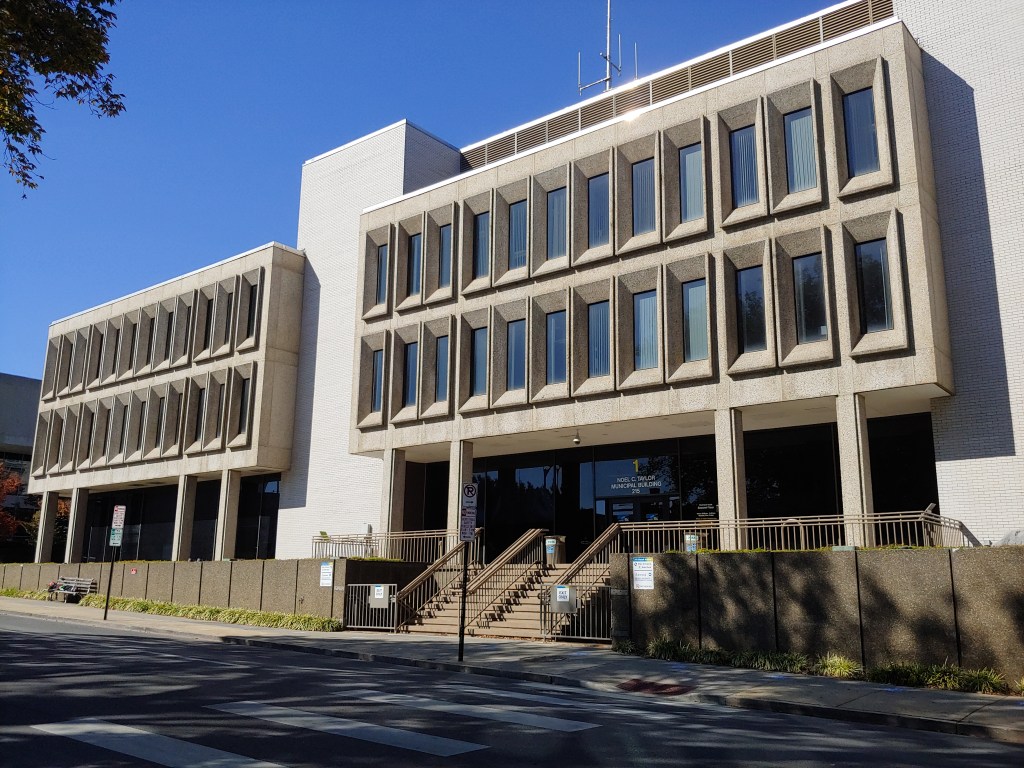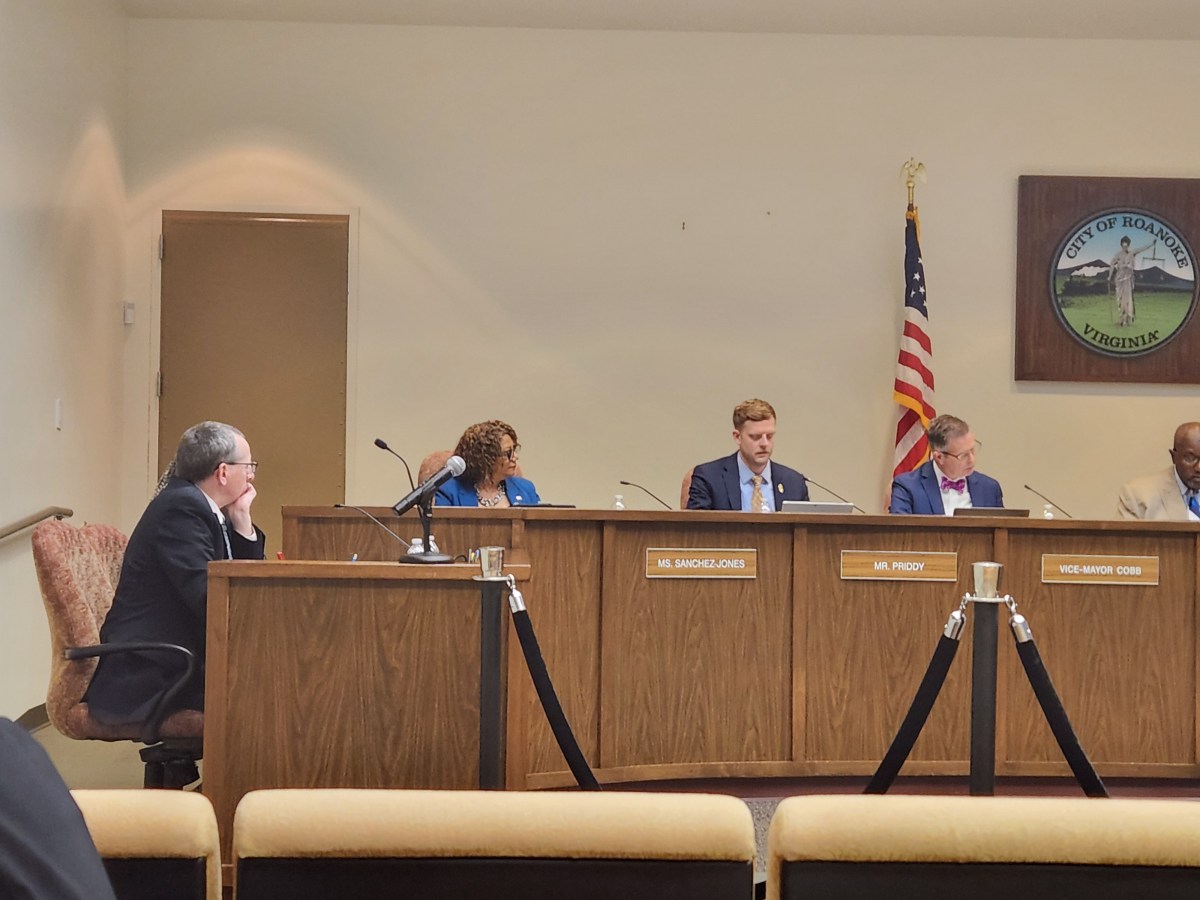The job of the next Roanoke City Council just got more interesting.
But first, so does the job before city voters this summer and fall.
City Manager Bob Cowell announced his resignation Monday night, at the tail end of the council meeting. Cardinal’s Tad Dickens has more details, such as they are. I’ll focus on the politics — and the future.
Cowell’s departure comes as the Roanoke City Council is about to undergo an unusual amount of turnover. At least three, and maybe four, members of the seven-member council won’t be there next year. Mayor Sherman Lea and council member Trish White-Boyd are retiring. Council member Luke Priddy is resigning to take a job out of town. That guarantees three new members on the dais.
Meanwhile, council member Stephanie Moon Reynolds is forgoing a reelection bid to run for mayor in a three-way race as an independent, a tough task when city elections are now in November and coincide with a highly partisan presidential race. If she falls short in her mayoral bid, that’s four new members of the council — a majority. If Democrat Joe Cobb wins the mayoral race, then he’d have to give up his council seat and a replacement for him would be selected, so that would also mean a fourth new member on the council. And if Republican David Bowers wins the mayor’s race, that would also mean four new faces on the council (although Bowers, who has served as mayor previously as a Democrat, wouldn’t truly be new, but he’d certainly represent a change from the current configuration). In other words, only if Moon Reynolds wins as an independent will the turnover be limited to three council members. (See full list of council candidates below.)
There hasn’t been that much turnover at one time on the Roanoke City Council in at least two decades. In 2004, voters elected three new members to the council, but one of them had served on the body previously.
For much of the 2000s, Roanoke voters have been content with the status quo, either reelecting incumbents or, in the case of retirements, electing successors who fit the same political mold as those they replaced.
Now voters have a chance to make a big change in direction — if they’re inclined to. Even if they don’t, the next council will have a task that doesn’t come along very often: hiring a new city manager. If, in fact, the current council decides to wait that long. In 2017, Chris Morrill’s last day was April 15; Cowell was offered the job in August and started Sept. 5. That’s a little over four months. That same timeframe this time around would put a new city manager getting hired in late September or early October — before the identity of the new council is known. That raises the question: How many people would want to be Roanoke’s city manager if they don’t know who their new bosses will be? That’s a big leap of faith. The alternative, though, would mean a longer wait under interim leadership. Which will it be? Neither seems ideal.
Regardless of who hires the next city council manager — the current council where many members are lame ducks, or the next one where many members will be new — here are some of the issues that the city manager will need to deal with:
Crime: Perception vs. reality
Roanoke is, generally speaking, a safe city. As with any city, parts of it are, parts of it aren’t. Roanokers were shocked last year when the city witnessed a record 31 homicides, even as the homicide rate nationally was going down. Roanoke now has a new police chief — Scott Booth, who was credited with driving down crime rates in Danville — and crime is down. So far this year, there’s been just one homicide. However, we all know that it takes a while before perception catches up to reality. Bowers has already signaled he intends to make crime one of his main talking points. Even if the actual crime rate is going down, the next council (and city manager) will need to confront the perception that crime is out of control.
Demographics: Roanoke is losing population
Roanoke rightly celebrated the 2020 census because that headcount showed the city not only growing but also pulling above the 100,000 mark for the first time since 1980. However, population estimates since then say the city is losing population again. The most recent figures from the Weldon Cooper Center for Public Service at the University of Virginia put Roanoke’s population at 99,045 — down 966 since 2020, a drop of 1%. Only one other locality in the Roanoke Valley has a faster rate of shrinkage. (Salem is down 1.4%, Roanoke County and Botetourt County are down 0.4%.)
This is not simply a fate of being in the western part of the state. The Lynchburg metro area to the east is gaining population; so is Montgomery County to the southwest.
Across Virginia, we see many localities losing population, but in Southwest and Southside, that’s often simply because deaths outnumber births and everything else — beneath the surface of population decline they’re often experiencing a net in-migration of more people moving in than moving out.
Roanoke, though, is losing population two ways: Deaths outnumber births, and more people are moving out than moving in. Since 2020, the city has had 683 more deaths than births, and 283 more people move out than move in. Here’s how to translate the first part of that demography: Dealing with deaths and births is pretty simple, at least in theory. Roanoke simply needs more young adults. That’s hardly a situation unique to Roanoke, but it also means Roanoke is competing with lots of other places.
The out-migration is more complicated, and we don’t have enough data to know the full picture of why people are moving out. To some extent, some out-migration is to be expected. Picture a young adult who moves into an apartment in the city and later acquires a partner. At some point children come along and that couple may want to buy a house with a yard, and that might take them out of the city. Still, Roanoke is running a deficit when it comes to moving vans.
The council will need to figure out what it wants to do — what it can do — to reverse these demographic trends. Wanting a reasonable number of new residents isn’t particularly controversial; where to put them can be. Proposed new housing developments often stir up neighborhood opposition. We saw that with a proposed apartment complex off Brandon Avenue (approved on the third try in 2022 by a 5-2 vote before a crowd where opponents outnumbered supporters 2-1). We saw it with the recent master plan for the undeveloped Evans Spring property (approved 4-3 after parts of the city sprouted “Save Evans Spring” signs).
For those who might wonder why a population loss of 966 people doesn’t immediately translate into 966 vacant housing units, consider this scenario. We start with a house that’s home to a family of four. The two children grow up and move away. One spouse dies. That’s a population loss of three, but the surviving adult is still in the family home, so if you want to bring in three new people to keep the population even, you need to find a place for them to live.
Downtown: The pandemic has changed it
Since hitting a low point in the mid-1970s, Roanoke’s downtown has undergone a remarkable transformation — from a place to avoid to a place that’s a destination. Roanoke’s downtown makeover has been so successful that for the past few decades there’s been pushback from some voters that too much attention has been devoted to downtown and not enough to residential neighborhoods. (Of course, nowadays downtown Roanoke is a residential neighborhood as well, with between 693 and 3,770 people, depending on how narrowly or broadly you define downtown.)
The pandemic, though, has changed American life. We’re seeing more people work remotely who once worked downtown — I’m one of those. That hasn’t been good for many downtowns, Roanoke’s among them. My favorite coffee shop was once open until 9 p.m.; now it closes at 5 p.m. Once it served lunch; now it doesn’t. A few weeks ago a popular downtown restaurant, Cabo Fish Taco, announced it’s pulling out, partly because there are no longer enough people downtown. It’s now looking for a new location elsewhere in the Roanoke Valley. Restaurants come and go, so we shouldn’t get too hung up over one departure, although we do need to recognize that the pandemic has changed things. Perhaps the time has come for more attention on downtown.
Speaking as someone who doesn’t live in the city, I love downtown Roanoke and look forward to my visits there. However, I also know people who are terrified to go downtown, particularly at night. This ties back to the perception vs. reality of crime in the city. I recently saw a video circulated on Facebook showing a late-night fight in a downtown parking lot. That kind of thing is not exactly encouraging people to go downtown and spend their money.
Poverty: Roanoke’s rate is nearly twice the national average
Roanoke, like all cities, has pockets of poverty. There’s nothing unique about Roanoke’s poverty, but it is Roanoke’s and it has the effect of holding back the city’s economic growth. The Census Bureau puts Roanoke’s poverty rate at 19.1%, nearly twice the national average of 11.5%. Roanoke’s educational attainment also runs lower than the national average — 28.4% of those age 25 and older have a bachelor’s degree, compared to 34.3% nationally. Neither of those figures will change quickly, but they are figures that factor into the city’s economy.
Roanoke voters — the Democratic ones, at least — will get a chance to weigh in on the city’s direction when they pick council candidates in the June 18 primary. All voters will get a chance to have their say in the November general election when the mayor’s office and three council seats are on the ballot. Will Roanoke have a new city manager before it gets a new mayor and a city council makeover? Stay tuned.

Who’s running for city council
Four candidates are running for three slots on the Democratic ticket in the June 18 primary: Terry McGuire, Jamaal Jackson, Phazhon Nash, Benjamin Woods.
For primary details, see our voter guide.
In November these are the line-ups:
For mayor: David Bowers (R), Joe Cobb (D), Stephanie Moon Reynolds (I)
For three council seats: The three Democratic winners from the June 18 primary vs. Republicans Jim Garrett and Nick Hagen. There may also be independents who make the ballot.
Of the seven members now on Roanoke City Council, here’s who is guaranteed to be on council next year:
- Joe Cobb (if he loses his mayoral bid, he’ll still have his council seat)
- Vivian Sanchez-Jones
- Peter Volosin

